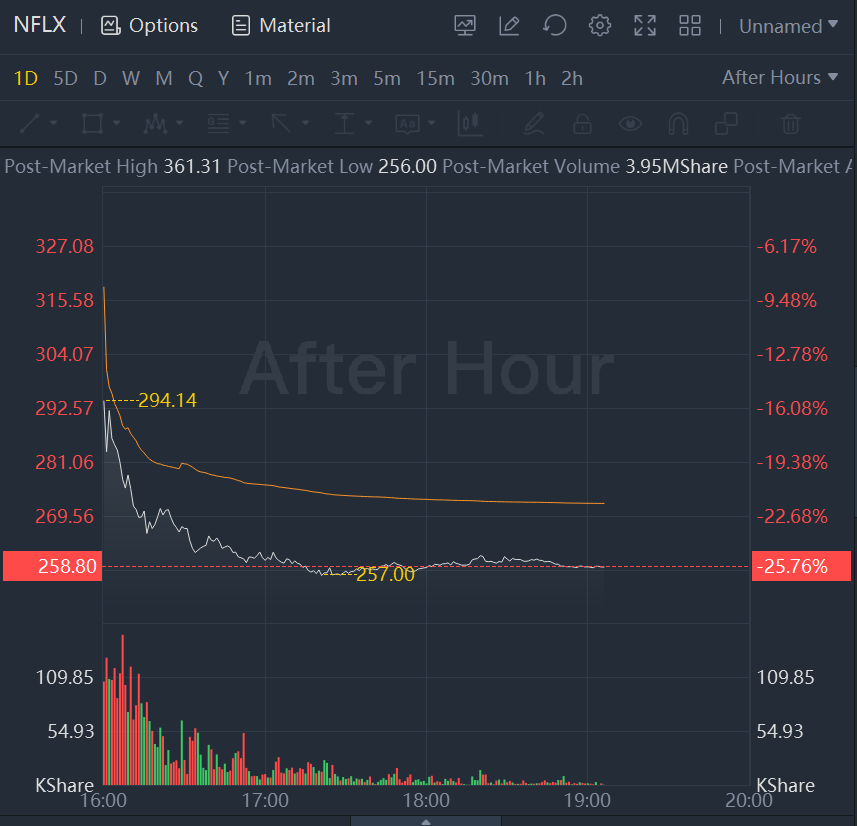Netflix Inc. lost subscribers globally in the first quarter and expects to lose even more this spring, as the streaming giant grapples with stiffer competition from rival services and rampant account sharing among its customers.
The company ended the first quarter with 200,000 fewer subscribers than it had in the fourth, missing on its own projection of adding 2.5 million customers in the period. Netflix said it expected to lose two million global subscribers in the current quarter.
Netflix shares fell 25% in after-hours trading. Through Tuesday's close, the stock was off more than 40% for the year so far.
Netflix blamed password sharing among its members and increased streaming competition for creating what it called "revenue growth headwinds." Netflix estimated that besides its almost 222 million paying households, the service is being shared with an additional 100 million homes including 30 million in the U.S. and Canada.
In its letter to investors, Netflix said it is testing password-sharing subscription models that it believes will allow it to monetize sharing and build revenue. The company said the portion of its members who share accounts hasn't changed much over the years, but as its overall subscriber base continues to expand, account sharing is hampering future growth in many markets.
The streaming giant said revenue growth has slowed considerably after years of 20%-plus gains. Revenue in the first quarter rose roughly 10% to $7.87 billion, below analysts' projections of $7.93 billion.
Netflix also warned that gains made during the Covid-19 pandemic hid the fault lines that have emerged in its business over the past few years. "Covid clouded the picture by significantly increasing our growth in 2020, leading us to believe that most of our slowing growth in 2021 was due to the Covid pull forward," the company said in its letter.
The subscription decline brought Netflix's paid global subscriber base to 221.6 million, down from 221.8 million in the prior quarter. Net profit was $1.6 billion, down from $1.71 billion a year earlier.
Besides competition and password sharing, Netflix said slowing growth reflected such factors as the rate of adoption of smart TVs, data costs and world events including increasing inflation, Russia's invasion of Ukraine and continuing disruption from the pandemic.
Netflix said shutting down its service in Russia resulted in the loss of 700,000 subscribers.
With a rate of growth that has been the envy of the industry for more than a decade, Netflix is seen as a barometer for streaming. As competition grew and programming costs rose, the company moved recently to raise the price for its monthly plans for the first time since 2020.
Netflix's approach contrasts with options presented by competitors. Walt Disney Co. announced last month that it would roll out a cheaper, ad-supported Disney+ subscription in the U.S. beginning in late 2022. The move would leave Netflix and Apple Inc. as the only major streaming services that don't offer a lower-cost, ad-supported option.
While Netflix has no stated plans to launch an advertiser-supported tier, during a recent investment conference its chief operating officer, Spencer Neumann, said: "Never say never."
Netflix's first-quarter operating margin was 25.1%, down from 27.4% a year earlier. The company said it aims to keep its operating margin at 20% in the future.
Netflix said its plan to right itself will be heavily focused on improving the quality of its programming and the recommendations that platform provides to its customers to keep them engaged in the content and on the service. Netflix already spends more than any other entertainment provider, with a programming budget that is expected to surpass $20 billion this year.
Although Netflix has several hit shows including "Stranger Things," "Bridgerton" and "The Crown," the service has also had its fair share of expensive flops recently including shows such as "Jupiter Ascending" and "Space Force."
World-wide, Netflix said its business in Central and Eastern Europe showed the effects of Russia's attack on Ukraine. Also down was Latin America, which lost 400,000 subscribers. In the U.S. and Canada, the company lost 600,000 subscribers, which it attributed to its recent price increase.
The company said it had grown in Japan, India, the Philippines, Thailand and Taiwan.
"Over the longer term, much of our growth will come from outside the U.S.," Netflix said.

Comments